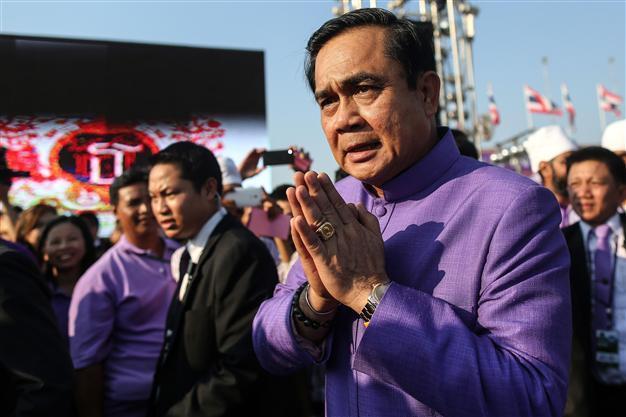Thai elections pushed back to September 2016: Junta
BANGKOK - Agence France-Presse

Thai junta chief and prime minister Prayut Chan-O-Cha makes a traditional greeting. AFP Photo
Thailand's junta confirmed May 27 that elections will not be held until September 2016, dealing a further blow to hopes that the kingdom's generals will swiftly hand power back to a civilian government.
When army chief and now Prime Minister Prayut Chan-O-Cha swept to power in a coup last May he initially said he hoped to hold elections within 15 months.
But that timetable has repeatedly slipped as the junta goes about rewriting the country's constitution, a process critics have described as an attempt to consolidate an unelected elite's control over Thai politics once new polls are held.
"The Prime Minister expects the elections will be held in September (2016)," junta spokesman Colonel Werachon Sukondhapatipak told reporters after Prayut met a delegation of UN ambassadors in Bangkok.
There had been confusion in recent weeks over when an election might be held after the junta-appointed committee tasked with drawing up the new constitution said the document should be approved in a referendum.
Prayut later signalled he was willing to consider a plebiscite on the new charter but added any referendum would delay polls.
The junta had previously said an election would likely take place early to mid-2016, but that timetable did not take into account a referendum.
Thailand's military toppled the elected government of Yingluck Shinawatra last May after months of sometimes violent street demonstrations paralysed her administration.
Thailand's constitution has undergone more than a dozen re-writes since the end of absolute monarchy in 1932 -- often after military coups.
Prayut insists the latest incarnation of the constitution -- backed by an anti-corruption drive -- will finally end the country's political paralysis.
Under the draft, future elections will be decided by a proportional representation system similar to Germany's that will favour smaller parties and coalition governments.
But to avoid legislative paralysis under coalitions, prime ministers will not have to be directly elected by the public and lawmakers will also be barred from becoming ministers to dilute their influence.
Opponents of the charter say it is a crude attempt to write the wealthy Shinawatra clan out of the kingdom's political future -- rather than rebuild Thailand's bitterly divided society.
Parties led by or aligned to Thaksin Shinawatra's billionaire family have won every election since 2001, prompting two coups backed by the royalist establishment and nearly a decade of acrimony that has frequently spilt into deadly violence.
Politicians from both sides of Thailand's divide have baulked at the sharp curbs on their power, while analysts say the draft is undemocratic and harks back to an era when a royalist and military elite had a stranglehold on politics.
